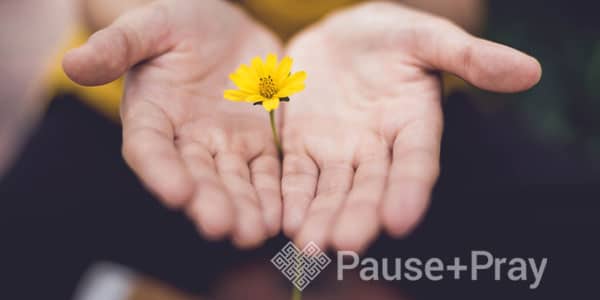Forty is one of those numbers that seem to turn up everywhere. It has many symbolic meanings but in biblical terms, as well as in the Asian traditions, it points to the idea of process, a time of trial or preparation during which people are made ready for the next stage in their development.
The Hebrews spent forty years in the wilderness before entering their promised land; Jesus spent forty days fasting in the desert before beginning to teach publicly; Muhammad spent forty days fasting in a cave and the Buddha sat for the same length of time meditating under the bodhi tree. According to Kabbalah, it takes forty years to complete a cycle of transformation from intention to integration.
In my book Sensing God: Learning to Meditate During Lent is a guide and, I hope, a friendly companion to an interior journey of forty days that you can make through the Christian period of Lent. It can also be a way of beginning to make the practice of meditation a part of your daily life.
What Is Meditation?
Like the number forty, meditation is found in all the major religious traditions—not, however, as a symbolic idea but as a practice. What is meditation? First, it is truly simple and that is why it is universal. The truly universal is always simple. But that does not mean it is also easy. Young children find meditation entirely natural and they certainly enjoy it. Perhaps they don’t find it easy, but because they approach it more as play (recreation), than as a solemn struggle or obligation, they can meditate, and choose to meditate. This means they experience the benefits and fruits of the practice very directly.
By benefits I mean things you can measure, like blood pressure, stress levels, sleep patterns and so on, all of which seem to be beneficially influenced by meditation. By “fruits” I mean things that you can’t measure, but you are certainly aware of. These are even more important to the human and humane quality of life—things like love, joy, peace, patience, gentleness, kindness and self-control. In recent years mindfulness training—a form of Buddhist practice adapted to the modern secular and scientific culture—has attracted much attention for the benefits it is claimed to bestow. Some skepticism is often raised at the scientific quality of these claims, but clearly people practice it because it makes them feel better.
Meditation is solitary—I can’t meditate for you and you can’t meditate for me. We have to take personal responsibility for learning it.
But at the same time meditation is communal—it gives us both a real, and more deeply felt sense of relationship and interdependence. In fact it is not exaggeration to say that meditation will make you a more loving person. However you perceive or describe it, the practice of meditation that this book can help you to start will lead to a change in you. So don’t meditate if you don’t want to change.
The forty days and nights of Lent are about simplification, purification, getting priorities reestablished and remembering that God, not my ego, is the center of reality.
Whatever discipline you take up for Lent (giving up sweets or alcohol, doing spiritual reading, spending more time with your loved ones, helping someone in need) it is about this—simplification and purification. The ancient word for this discipline was ascesis and it was used as a metaphor from the training exercises of athletes. Lent is a time for spiritual ascesis or exercise, shedding some unnecessary mental fat, toning the muscles of attention and patience.
Breathe. Pray. Repeat.
Like everything new, meditation can seem strange at first. Allow time in your day to meditate and allow time to feel familiar with the experience. One day you will see how important meditation is to the quality of the meaning of your life—each day. For now, and the next six weeks, just do it. Do the best you can (not less than your best), to meditate twice a day for twenty minutes. If you can only do it for five or ten minutes, start there. If you can only do it once a day, start there. But begin.









1 thought on “Lent and Meditation”
Great article! A nice guide for Lent and a reminder to turn attention away from self and onto God, allowing him to have the center of our being. Having your heart and soul connect with his almighty love and power is a conscious act of devotion requiring strong belief in the magnitude of his presence.